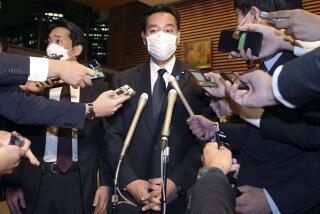Japan Official Retracts War Denials : Asia: Minister apologizes for disavowing Tokyoâs aggression 50 years ago. Critics seek his resignation.
TOKYO â Amid official protests from China and South Korea, Justice Minister Shigeto Nagano on Friday withdrew his statements claiming that the 1937 Rape of Nanking was a âfabricationâ and disavowing Japanâs aggression in Asia.
In a nationally televised news conference, he said he will accept Prime Minister Tsutomu Hataâs decision about his future in the Cabinet that Hata formed eight days ago.
Winding up a four-nation tour of Europe, Hata noted in Brussels that Nagano had withdrawn his comments and apologized. The prime minister, who is to return today, said he hopes to work with his fellow Renewal Party member as justice minister.
Leaders of the Buddhist-backed Clean Government Party--the No. 2 party in Hataâs coalition--and the opposition Liberal Democrat, Socialist and Communist parties all called for Naganoâs dismissal.
His claims struck at the heart of a new policy launched last August by former Prime Minister Morihiro Hosokawa and Hata--who was deputy prime minister and foreign minister in Hosokawaâs Cabinet--to frankly acknowledge Japanâs record of colonialism and aggression and apologize wholeheartedly to its victims.
Sincere self-reflection, Hata has said, is necessary if Japan is to win the trust of its neighbors and play a significant political role in Asia.
The justice minister, 71, who was a 23-year-old captain in the Imperial Army when World War II ended and rose to chief of staff of Japanâs postwar army, told the Mainichi newspaper in an interview published Wednesday that the Rape of Nanking was a âfabricationâ and that Japan had been forced by âother foreign nationsâ to ârise up to survive.â
Japanâs ultimate motive, he added, had been âto liberate colonies and firmly establish the Greater East Asia Co-Prosperity Sphere.â
On Friday, Nagano declared that âmy recent remarks about history were inappropriate. I wish to withdraw them.â
He said he âcannot deny that the Nanking Great Massacre did occur.â Estimates of the number of Chinese soldiers and civilians killed after the Japanese army took over Nanking in 1937 that range from 3,000 to 300,000 had made him doubt whether the incident could be called âa Great Massacre,â he said. But he said he now realizes that even if the number of victims had been 1,000 or 2,000, âit still can be called âa Great Massacre.â â
âIt was an unfortunate incident for which (we) must apologize to the Chinese people,â he added.
Nagano said his description of the war as designed to free colonies was a âself-conceited, self-righteousâ excuse that could not be used to justify Japanâs Pacific war.
He said he agreed with Hata, who rebuked him late Wednesday, in saying that Japanese âmust face directly the fact that many peoples of other countries suffered unbearable pain by our aggressive acts. This must not be repeated.â
Nagano made his comments to the Mainichi newspaper as part of a standard round of interviews that all ministers give major newspapers separately after they are appointed to the Cabinet. But his remarks came at a particularly bad time.
In an election campaign last summer, Hata had emphasized that Japan must face its past honestly; Hosokawa had followed up this view by flatly declaring at his first news conference that Japanâs Pacific war, which began in 1931 in Manchuria, was âa war of aggression.â
After Hosokawa apologized on trips to South Korea and China, both of Japanâs neighbors indicated that they were finally ready to put to an end to decades of demands for heartfelt apologies they had failed to win from Japan under 38 years of Liberal Democratic Party rule.
But in both China and South Korea, reaction to Naganoâs remarks was swift and virulent.
Chinaâs Foreign Ministry called in the Japanese envoy in Beijing and âdemanded the Japanese government treat this matter seriously and severely.â In Shanghai, President Jiang Zemin expressed his displeasure to Bunpei Hara, the visiting Speaker of Japanâs upper house of Parliament.
South Koreaâs foreign minister, Han Sung Joo, called in Japanâs ambassador and demanded that âappropriate measuresâ be taken. Koreaâs colonization, which began officially in 1910, ended with Japanâs World War II defeat in 1945.
More to Read
Sign up for Essential California
The most important California stories and recommendations in your inbox every morning.
You may occasionally receive promotional content from the Los Angeles Times.










